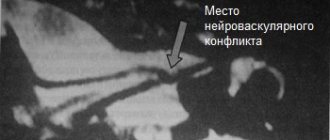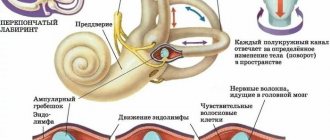Dizziness
It happens that there are no physiological reasons for dizziness. The body, at first glance, is healthy and works great, but the head still feels dizzy again and again. If something similar has happened to you, think about how you felt before the dizziness. Perhaps severe fear or anxiety? Panic? In this case, it is quite possible that your dizziness was psychogenic.
Psychogenic dizziness is dizziness caused by a person's psychological or emotional state. Sometimes it is called imaginary because, unlike true dizziness, it is not associated with a disruption of the vestibular apparatus. [1] Actually, this is why the sensations during attacks of vestibular and psychogenic dizziness are so different: vestibular dizziness is similar to movement, rotation, and psychogenic dizziness is similar to fog in the head, instability, fear of falling, lightheadedness, etc. [2][3]
Despite the fact that psychogenic dizziness occurs due to emotional problems, its symptoms can be very real. For example, shortness of breath, sweating, tinnitus, headache, rapid heartbeat, etc. [1]
How to understand that dizziness is psychogenic?
Only a specialist can find out. During diagnosis, he must, first of all, exclude all other possible causes of dizziness. To do this, he needs to find out from you as much as possible about the conditions under which attacks occur, how long they last and what they look like, whether they are accompanied by other symptoms, etc. In some cases, additional examination by several specialists (otoneurologist, cardiologist, hematologist, etc.), laboratory and radiation diagnostics, as well as additional studies (for example, a study of balance or the condition of the inner ear, ECG, etc.) may be necessary. [2][3]
After the doctor is convinced that you have psychogenic dizziness, you need to understand what kind of disorder caused it. Most often these are [1]:
Anxiety or anxiety-depressive disorders (they are felt as anxiety, constant fears for loved ones, sudden mood swings, worry about little things, tension, stiffness, loss of sleep, decreased performance, increased fatigue, muscle and other pain, etc.) [ 4]
Panic disorder (characterized by recurrent panic attacks and anxiety in anticipation of a new attack). [5] Panic attacks include fear, shortness of breath, palpitations, nausea, weakness, lightheadedness, lightheadedness, fear of falling, and loss of balance. Panic attack is one of the most common anxiety disorders, which approximately 3% of the population has experienced at least once in their lives. [6]
Phobic postural vertigo can be described as a feeling of instability in the form of attacks. Simply put, it feels like a momentary loss of balance. It can occur spontaneously, but is more often associated with specific stimuli or situations that cause fear (i.e., phobias). [4][7]
Dizziness
Dizziness is the second most common symptom with which adults consult a neurologist (back pain and headaches come first). The causes of dizziness can be osteochondrosis of the cervical spine, diseases of the inner ear, vestibular apparatus, low blood pressure, cerebrovascular accident, psychogenic disorders, etc. Usually, attacks of dizziness are accompanied by nausea, vomiting, and severe weakness.
A neurologist can help determine the cause of dizziness. Based on the diagnosis, treatment is prescribed, which includes: using medications for dizziness, performing special exercises designed to train the vestibular system, following a special diet, and in some cases, surgery.
What is dizziness?
True dizziness is a condition in which the patient has a false sensation that surrounding objects are rotating around him or a feeling of his own movement, rotation.
For an example of true dizziness not associated with illness, consider the dizziness that occurs after riding a merry-go-round. If the carousel is stopped abruptly, it seems to a person that the surrounding objects continue to rotate around him, as if the carousel were still in motion.
Most often, the occurrence of true dizziness is a symptom of human diseases associated with the system for controlling balance and body position in space, which includes the eyes, the vestibular apparatus of the inner ear, and sensory receptors of the muscles, joints and bones of a person.
If dizziness is caused by a balance disorder, it is often accompanied by nausea and vomiting.
It is possible to define dizziness as a feeling of disturbed orientation of the body in space, which means a feeling of rotation of the patient or objects around him. Often, dizziness refers to various sensations: slight instability, a feeling of lightheadedness, intoxication, or the impression of spinning your body or surrounding objects.
Dizziness occurs when one of the three anatomical systems in the body is stimulated, which are responsible for controlling the body’s balance in space: vestibular, visual, muscular. This can happen if, for example, you spin quickly on a carousel. But if the occurrence of dizziness is not associated with a visible cause, it may be a symptom of some disease. It may also appear due to damage to the peripheral parts of the vestibular apparatus of the inner ear or the vestibular nerve. In this case, dizziness is called peripheral. In addition, dizziness can be caused by diseases of the brain, then it is called central vertigo.
Causes of dizziness
There are many reasons that cause dizziness. It may occur due to damage to the vestibular nerve or inner ear, in which case it will be called peripheral. Also, the causes of dizziness may include diseases of the brain, in this case we are talking about central vertigo. The symptoms accompanying dizziness, the nature of dizziness, the duration and frequency of attacks make it possible to establish the true cause of the disease:
- Discharge from the ear and decreased hearing may indicate inflammation of the inner ear, in which case conservative treatment may be required.
- Dizziness, accompanied by tinnitus, hearing loss, nausea, and vomiting, probably indicates the presence of Meniere's syndrome. In the absence of a disorder of auditory function, dizziness may be a manifestation of vestibular neuritis. Neuritis is characterized by a sudden onset. When trying to stand up and moving the head, the feeling of spinning, severe dizziness and constant vomiting intensify. Most often, these symptoms gradually disappear within 2-3 days. After the end of the acute period, in some cases the illusion of movement during linear acceleration, for example, in a lift or car, remains.
- If sudden one-sided deafness, tinnitus, or vomiting occur, in half of the cases patients are diagnosed with a perilymphatic fistula. Also, a fistula can manifest itself with varying degrees of dizziness and hearing impairment (hearing loss, noise, ringing in the ears).
- Unilateral hearing loss and dizziness exclude a brain tumor. Such dizziness begins gradually and is often accompanied by gradually increasing headaches. Increased dizziness is common in certain body positions.
- Transient cerebrovascular accident and stroke are characterized by an acute onset, a combination of dizziness with impaired coordination of movements, double vision, weakness in the arms and legs, and sensitivity disorders. As a rule, dizziness is persistent and lasts several days.
- Dizziness, accompanied by instability, a feeling of disorientation in space, aggravated by movements in the cervical spine, especially sudden ones (such as flexion, extension and turning the head to the sides), pain and limited mobility in the cervical spine, most likely due to diseases of the cervical spine spine.
- Trauma to the head or spine that precedes vertigo indicates a traumatic brain injury or whiplash injury.
- Dizziness associated with changes in body position in space most likely indicates benign positional vertigo, the presence of which is determined by a simple positional test.
- Dizziness preceding a headache attack indicates basilar migraine. Dizziness can last from several minutes to an hour, accompanied by nausea, vomiting, tinnitus, and other neurological symptoms.
- Dizziness that occurs during a flight, traveling in a car, train or on water is most likely a consequence of motion sickness.
- Taking antibiotics can also cause dizziness. In this case, it is necessary to stop taking them or reduce the dose of the drug.
The most common forms and causes of dizziness
According to modern research, dizziness is most often a symptom of the following diseases:
- Benign paroxysmal positional vertigo (BPPV).
- Osteochondrosis of the cervical spine and vertebrobasilar insufficiency.
- Inflammation of the vestibular nerves (vestibular neuritis).
- Brain tumors.
- Psychogenic dizziness.
- Meniere's disease.
- Basilar migraine.
It should be noted that more than 80% of cases of true dizziness are due to BPPV.
Below we will discuss the main diseases that accompany dizziness, as well as the characteristics of dizziness in each case.
Benign paroxysmal positional vertigo (BPPV)
Benign paroxysmal positional vertigo is one of the most common forms of true vertigo. The name of this disease is deciphered as follows: “benign” means a favorable, non-dangerous course of the disease, “paroxysmal” means the sudden onset of dizziness, “positional” means the onset of dizziness at the moment of turning the head in a certain direction. The reason for the development of benign positional vertigo is irritation of the vestibular apparatus receptors by otolith stones, which are located in the semicircular canals of the inner ear. This disease usually occurs in people over 50-60 years of age, after an injury or infection, but can occur spontaneously in a person of any age.
The main symptoms of benign positional vertigo are:
- The appearance of severe dizziness when throwing back the head, when turning the head to the side, when bending over, when turning in bed.
- The duration of severe dizziness ranges from several seconds to several minutes, it may be accompanied by weakness, severe nausea, and vomiting.
- A series of attacks of dizziness may occur, after which they may disappear for a while.
Treatment of benign positional vertigo is carried out under the supervision of a neurologist using a special exercise, which is partially described below (Complex No. 1). The effectiveness of this exercise reaches 90%, and the duration is only 1-2 minutes.
Psychogenic dizziness
Psychogenic dizziness ranks second in prevalence after BPPV.
Unlike BPPV, psychogenic dizziness is not associated with disturbances in the functioning of the vestibular apparatus, that is, it is not true dizziness.
Main characteristics of psychogenic dizziness:
- Dizziness can be described as a feeling of fog in the head, confusion, fear of losing consciousness, falling, but not as a spinning of objects or the object itself.
- Attacks of dizziness occur spontaneously, often in stressful situations, in closed confined spaces (transport, elevator), in crowded places.
- In addition to dizziness, patients note various other symptoms that resemble certain diseases of the internal organs. For example: pain and tension in the muscles, in the chest, in the heart area, in the abdomen, a feeling of shortness of breath, a sore or lump in the throat, irritability, restlessness, anxious sleep, a feeling of internal fear, tension, strong groundless anxiety about the state of one’s own health and well-being. loved ones, etc.
Psychogenic dizziness can be considered one of the most common manifestations of vegetative-vascular dystonia (VSD). Attacks of false dizziness are especially common in patients with anxiety disorders and panic attacks. Determining the psychogenic nature of dizziness is important for proper treatment. Much more effective for psychogenic dizziness will be treatment that is intended to treat VSD (sedatives, psychotherapy) than treatment with specific medications prescribed in all cases of true dizziness.
Dizziness with migraine
Migraine is one of the most common types of headaches. During a migraine attack, in some cases, there is a disturbance in blood circulation in those areas of the brain that control the functioning of the vestibular apparatus. The result is severe dizziness. Immediately after it, a severe headache in the occipital region, imbalance, vomiting, and intolerance to noise and light may develop. Some migraine patients may only feel severe dizziness and nausea, but may not experience any headaches. One of the harbingers of migraines in the future is attacks of severe dizziness, imbalance, nausea and vomiting in children, which over time turn into typical migraine attacks.
Dizziness in Meniere's disease
Meniere's disease is characterized by attacks of severe dizziness and deafness (usually only in one ear), occurring periodically and gradually leading to hearing loss. At the moment, the cause of Meniere's disease is not reliably known. It is assumed that in certain cases the occurrence of the disease may be due to injury, viral infection, or allergy.
The typical manifestation of Meniere's disease is an acute attack of severe dizziness, lasting from several hours to several days. It is accompanied by tinnitus, a feeling of pressure inside the ear, decreased hearing (in one ear), nausea, and vomiting.
Typically, attacks of Meniere's disease occur within a few hours one after another, after which they disappear for a while, but sooner or later they appear again. Dizziness due to osteochondrosis, neck and head injuries, vertebrobasilar insufficiency
As mentioned above, for the balance control system to work, sensitive receptors of the bones, ligaments, muscles, joints of the whole body and, first of all, the bones, muscles, and ligaments of the neck are necessary.
Degenerative diseases of the cervical spine (including osteochondrosis) are one of the common causes of dizziness, described by patients as unsteady gait, and in very rare cases as a feeling of spinning.
With osteochondrosis of the spine, not only the normal functioning of the sensitive receptors of the neck is disrupted, but also the blood circulation through the vertebral arteries located in the brain stem, which supply blood to the parts of the brain responsible for the functions of balance and maintaining the position of the body in space, may be impaired.
A chronic circulatory disorder that occurs in the lower parts of the brain (vertebrobasilar basin) is called vertebrobasilar insufficiency. A certain role in the development of vertebrobasilar insufficiency is played by a prolonged increase in blood pressure (hypertension) and atherosclerosis of the neck vessels. Most often, vertebrobasilar insufficiency is observed in older people. In addition to dizziness, this disease is accompanied by the following symptoms: headache (mainly in the back of the head), tinnitus, memory loss.
Acute circulatory disorders in the vertebrobasilar system are manifested by severe dizziness, loss of consciousness, vomiting, double vision, and weakness.
Injuries to the head and cervical spine (especially those sustained in car accidents) can also cause dizziness. Typically, trauma-induced dizziness is most pronounced in the first days after the injury; it gradually decreases as the patient rehabilitates.
Dizziness due to brain tumors
In some cases, brain tumors that are located near the inner ear can cause severe, progressive dizziness. In addition to dizziness, symptoms of a tumor may include:
- headache
- noise in ears
- hearing loss (usually in one ear)
- nausea
- strabismus or facial paralysis
As a symptom of a brain tumor, dizziness is most common in children and young adults.
Dizziness with vestibular neuritis
Vestibular neuritis is an inflammation of the vestibular nerve, which carries impulses to the brain from receptors in the inner ear. When inflamed, the vestibular nerve temporarily loses its ability to conduct impulses. This is manifested by severe dizziness, unsteady gait, nausea and vomiting.
The main cause of vestibular neuritis is viral infections. Therefore, attacks of dizziness that are associated with it may be accompanied by fever, runny nose, cough, and weakness. Often true dizziness is combined with psychovegetative disorders, such as: nausea, vomiting, sweating, pallor, anxiety. This is explained by the close connection between the vestibular and autonomic systems. Any damage to the vestibular system will immediately lead to autonomic disorders. Despite the feeling of fear that accompanies almost any attack of dizziness, it in itself is not a life-threatening condition. Timely and correct diagnosis of the disease that caused dizziness is important.
Dizziness during pregnancy
Quite often during pregnancy, false dizziness is observed, which is manifested by a feeling of instability, weakness, and near fainting. In pregnant women, attacks of dizziness are usually associated with a decrease in blood glucose concentration and hypotension.
For the treatment of dizziness in pregnant women, the following recipe is effective: 1-2 tbsp. Dissolve spoons of sugar in a glass of warm boiled water, drink in the morning after waking up or before leaving the house.
Pregnant women (especially in the first half of pregnancy) should always carry water with them. When the first signs of dizziness appear, you should try to drink as much as possible.
What symptoms are not diagnosed as dizziness?
As it becomes clear from the above, the term dizziness has a rather narrow medical interpretation: a false sensation about one’s own rotation or the rotation of the surrounding world. A number of other symptoms that are not actually dizziness are often mistaken for dizziness:
- Weakness, feeling of unsteadiness, confusion in the legs, nausea
- Feeling of unsteady gait, impaired balance
- Darkening of the eyes as a result of sudden rise to one's feet from a lying or sitting position
- Feeling close to fainting, loss of consciousness
- Veil before the eyes.
A patient suffering from dizziness at a doctor’s appointment should tell as accurately as possible about his state of health, try to describe his condition, the symptoms observed, and not just tell the doctor that he suffers from “dizziness.” The plan for further examination and treatment depends on the accuracy of the patient’s description of his symptoms.
In contrast to true dizziness, as has been said, which is a consequence of disruption of the balance system, false dizziness, described by patients as a feeling of instability, darkening in the eyes, weakness and blurred vision, may be a sign of vegetative-vascular dystonia, anemia, chronic fatigue, hypotension (low blood pressure). blood pressure), hypovitaminosis. Dizziness can also be confused with episodes of lipothymia (a sharp decrease in muscle tone during severe physical stress), fainting, and short-term attacks of epilepsy.
Special attention should be paid to sudden attacks of weakness and dizziness in patients with diabetes mellitus. For this category of patients, weakness and dizziness may be a sign of a dangerous decrease in blood glucose levels.
How does the human balance system work?
True (central, systemic) vertigo is most often a manifestation of various diseases of the system that provides balance and control over the position of the human body in space.
The components of this system are:
- The vestibular apparatus, which is located deep in the skull, where there are sensitive receptors that respond to linear or angular acceleration of the human body in space.
- Eyes that provide visual information about the location of the human body, as well as its individual parts in space relative to other objects.
- Proprioceptors (sensitive receptors), which are located in human bones, joints, muscles, ligaments, providing accurate information about the position of individual parts of the human body in space, as well as relative to each other.
At the same time, all three components of the system (vestibular apparatus, eyes, proprioceptors) send data to the brain. In certain areas of the brain, this information is analyzed and then processed into a person’s ideas about how his body is located in space and in relation to surrounding objects.
When data that comes from one of the sources is distorted for any reason (for example, irritation of the receptors of the vestibular apparatus at rest), an incorrect idea of the body’s position in space and its movement is formed in the brain. In this case, an illusory sensation arises that the body is moving and rotating at a time when in fact it is motionless.
The reasons that lead to disruption of the balance system are different. Today, there are more than 80 diseases whose symptoms include dizziness. This article will discuss only the most common of them.
When should you immediately consult a doctor if you have dizziness?
In all cases of dizziness accompanied by the following symptoms, you should consult a doctor as soon as possible:
- Severe headache and weakness in the muscles of the arms or legs.
- Severe dizziness that does not go away for more than an hour.
- Severe dizziness that occurs in a patient with hypertension or diabetes.
- The patient fell and injured himself as a result of dizziness.
- The patient lost consciousness as a result of dizziness.
- Fever.
- Persistent vomiting.
What to do if you feel dizzy?
If dizziness occurs, it is recommended to consult a neurologist. Establishing the exact cause of dizziness and prescribing the correct treatment requires a comprehensive examination of a therapist, neurologist, endocrinologist, and otolaryngologist.
If dizziness develops acutely and there are speech disturbances, weakness or clumsiness in the limbs, double vision, numbness or other sensory disturbances, you should immediately call a doctor. It would be best to lie down before the doctor arrives and measure your blood pressure. If the pressure is elevated, measures should not be taken to reduce it sharply. Remember: in most cases, a decrease in blood pressure below normal is more dangerous than an increase in blood pressure. Do not take medications without consulting your doctor.
Tests that help establish a diagnosis
Neurologists, otolaryngologists, and ophthalmologists are involved in the diagnosis and treatment of dizziness diseases. In order to clarify the cause of dizziness and prescribe the correct treatment, the patient undergoes a number of examinations:
- examination by an ophthalmologist,
- X-ray of the skull and cervical spine,
- Doppler ultrasound of the main arteries of the head,
- computed tomography (CT) or nuclear magnetic resonance (NMR),
- audiographic examination.
Diet for the treatment of dizziness
Due to the fact that in some diseases that are accompanied by dizziness, there is an excess of fluid filling the inner ear (for example, hydrops of the inner ear, Meniere's disease), it is recommended to observe a number of dietary restrictions to remove excess fluid from the body for these patients:
- Limit the consumption of salty foods and table salt (no more than 2 g per day).
- Limitation of fluid intake (no more than 1.5 liters per day).
- Exclusion of tobacco and alcohol.
- Limit consumption of chocolate, tea, coffee.
Rules for organizing the life of a patient prone to dizziness
Except in cases where dizziness is a sign of a dangerous disease (for example, a brain tumor), it does not pose a particular danger to human life. But its consequences can be very dangerous, for example injuries resulting from falls. Patients suffering from chronic forms of dizziness are recommended to protect their place of work and home according to the following principles:
- Cover the floors with soft carpets that do not have folds or kinks that could cause tripping hazards.
- In the bathroom, install a shelf with accessories in an easily accessible place that you can reach without getting up; stick special non-slip rubber pads on the bottom of the bathroom.
- In the shower stall, install grab bars and place a chair on which you can shower while sitting.
- Equip the existing stairs in the house with double-sided railings. When climbing stairs, always hold on to them, even if you are not dizzy at the moment.
- Place the night light on your bedside table so that you can turn it on without getting out of bed.
- If possible, place your phone near your bed so that you can reach it without getting up.
- When getting out of bed, take your time, get up with caution, sit on the bed for 1-2 minutes and only get up completely if you feel normal.
- Avoid activities that require balance and precise control of body position in space (active sports games, cycling).
Exercises to treat dizziness
Some types of vertigo (for example, benign positional vertigo) can be successfully treated with special exercises.
Complex No. 1.
- Sit on the floor, stretch your legs and look ahead.
- Quickly lie on your back, quickly turn onto your left side, continuing to look ahead.
- Quickly roll over onto your right side, then just as quickly roll over onto your back, then return to a sitting position.
It is very important in this case to quickly complete the exercise. This is necessary to maintain the therapeutic effect. Before performing an exercise at a fast pace, do it several times, slowly, slowly, remembering the order of movements.
Complex No. 2.
Standing position, look ahead. Turn left (around the left heel), turn right (around the right heel).
Complex No. 3.
- Sitting on a chair, quickly lean forward and look at the floor. Also quickly straighten up, turning your head to the left.
- Repeat the exercise again, turning your head to the right.
- Quickly turn your head to the left, then to the right. Repeat three times.
- Bend over quickly, looking at the floor. Then quickly straighten up and keep your head straight.
- Quickly nod your head three times, bringing your chin to your chest.
It is necessary to repeat these exercises 2-3 times a day for 3-4 months in the safest, calm environment, having previously agreed on the possibility of performing them with your doctor.
At first, after starting exercise, dizziness may increase, but with continued regular exercise, it decreases very quickly and gradually disappears.
Treatment of psychogenic dizziness
Many doctors deal with the problem of dizziness, but when treating psychogenic dizziness, consultations with a neurologist and psychotherapist are especially important.
Typically, complex therapy is used to treat psychogenic dizziness, which includes both medicinal (including antidepressants) and non-medicinal treatment methods. [5] Of great importance are:
• vestibular gymnastics, which is aimed at training and reducing the excitability of the vestibular apparatus; [7]
• breathing exercises, which help reduce hyperventilation (its manifestations include lack of air, dissatisfaction with inhalation, inability to take a full breath, etc.);
• psychotherapy.
It has long been proven that a person’s psychological health is as important as physiological health. [4] Keep this in mind and be sure to consult a specialist if you feel dizzy.
Dizziness in the morning
Dizziness after heavy exercise or emotional stress is a normal reaction of the body.
Dizziness in the morning is not a disease in itself. This condition can be caused by pathologies of the cardiovascular system, auditory organs, and neurological diseases.
In any case, before finding out the causes of dizziness, this condition must be alleviated:
- do not rise to your feet abruptly, it is better to lie down for about fifteen minutes
- eliminate oxygen starvation and take deep breaths
- put a cold compress on your forehead
- If you feel chills, you need to cover yourself with a blanket or a warm blanket
- drink a glass of water
A condition where you feel dizzy after sleep can be a harbinger of such serious illnesses as: heart attack; stroke; oncological diseases; atherosclerotic plaques; pathologies of the nervous system, and may be easily removable.
Main provoking factors:
Osteochondrosis of the cervical region
The disease occurs as a result of deformation of the vertebrae and their incorrect location. This leads to the fact that they compress the artery that carries blood to the brain. At night, the sleeper unconsciously takes a position in which the artery suffers even more. Therefore, after sleep in the morning, I feel dizzy and shaky.
Sugar
A sharp decrease in blood sugar occurs due to poor nutrition. Often this condition is experienced by women who are addicted to diets or fasting.
Orthostatic hypotension
The pathological condition occurs when there is a sudden change in body position. This is due to low vascular tone; they do not have time to quickly adapt to changing circumstances. Because of this, blood pressure levels decrease. Therefore, when getting out of bed after sleep in the morning, you feel dizzy.
Malfunctions in the functioning of the vestibular apparatus, in particular the middle ear.
Not hazardous to health. Your head can feel dizzy at any time, including after waking up. It can be easily corrected if you contact a specialist in a timely manner.
Intracranial hypertension
High pressure in the skull puts a very strong strain on the body. In this condition, the headache is severe at any time of the day - at night, in the evening, in the morning after sleep. The pathology is quite dangerous.
Vegetovascular dystonia
The disease is associated with insufficient vascular response to signals supplied by the central or peripheral nervous system. As a result, they have weakened tone. The disease is especially common among teenagers.
Intestinal disorders, poisoning or simply toxicosis during pregnancy
After consuming low-quality or expired food products, toxins accumulate in the body. This happens especially actively at night. After which dizziness occurs in the morning.
Heart diseases
If the heart muscle does not work properly, the activity and tone of blood vessels is significantly reduced. This negatively affects blood flow, it becomes slower and sluggish. As a result, all body cells lack nutritional compounds, as well as the vital element oxygen. This leads to dizziness after sleep, and it is difficult for the patient to get out of bed.
Psychoneurological diseases
Daily psycho-emotional stress does not pass without leaving a trace. Due to nervous shocks, the brain is constantly tense and works hard. This leads to rapid depletion of reserve forces and overwork.
Anemia
Dizziness in the morning with anemia occurs due to low hemoglobin content in the blood and insufficient nutrition of the tissues of the vestibular apparatus. Common symptoms of anemia are mild dizziness, nausea, fainting, unsteadiness of gait.
If severe dizziness in the morning continues regularly, you should consult a doctor and undergo a comprehensive examination.
In conclusion, I would like to say that the correct lifestyle should be made the norm.
Have questions? Write to the doctor.
Bibliography:
1. Filatova E. G. Diagnosis and treatment of psychogenic dizziness // Attending physician. –2009. - No. 5/9. — https://www.lvrach.ru/2009/05/9155798/ (Access date: 07/18/2016).
2. Drapkina O.M., Chaparkina S.M., Ivashkin V.T. Dizziness in the practice of an internist // Cardiovascular therapy and prevention. – 2007. – No. 6 (4). – pp. 107-114.
3. Zamergrad M.V. Vestibular vertigo // Neurology, neuropsychiatry, psychosomatics. – 2009. – No. 1. – P. 14-18.
4. Sitdikova A.I. et al. Psychogenic dizziness: clinical features and diagnostic principles // Bulletin of modern clinical medicine. – 2015. – T.8. — No. 6. – pp. 76-79.
5. Filatova E. G. Anxiety in neurological practice // Lech. nervous bol. – 2005. – No. 1. – P. 7–14.
6. Melnikov A. N., Stanko E. P. Panic attacks in children and adolescents // Journal of the Grodno State Medical University. – 2005. – No. 3 (11). – pp. 33-35.
7. Golubev V.L., Vein A.M. Neurological syndromes. – M.: Eidos Media, 2002. – 832 p. – pp. 695–704.










